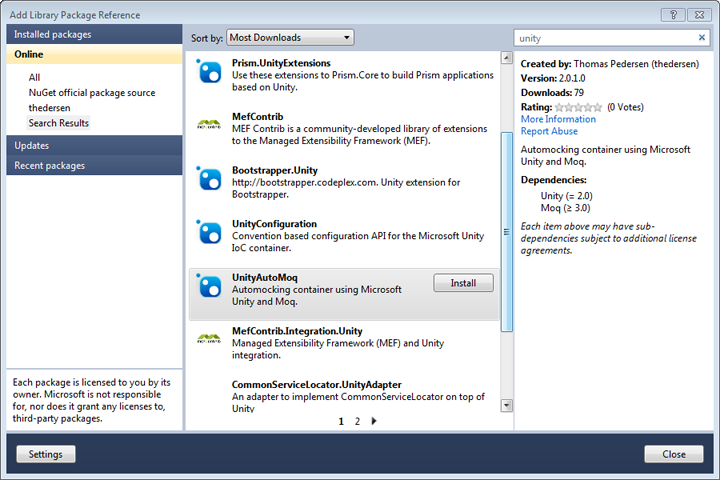Auto mocking with Unity and Moq
As mentioned in my previous post we used the Microsoft Unity container in a previous project. We also used Moq as our mocking library. Combining these two and making an auto mocking container seemed fairly easy, so I went ahead and created something I called UnityAutoMoq.
Now, some say that auto mocking is a bad practice since it can hide certain design flaws in your system, like classes with to many dependencies etc. I say, that if you have these issues, it is probably not the auto mocking that is causing them. Auto mocking can increase your productivity, so I have no issues with using it. In fact, I encourage you to do so.
Using the container
1
2
3
4
5
6
7
8
9
10
11
12
13
14
15
16
17
18
19
// Creating a new instance of the auto mock container
var container = new UnityAutoMoqContainer();
// Resolving a concrete class automatically creates
// mocks for the class dependencies and injects them
// before returning an instance of the class
Service service = container.Resolve<Service>();
// Resolving an interface, returns a mocked
// instance of that interface
IService mocked = container.Resolve<IService>();
// GetMock returns the mock on which you can do setup etc.
Mock<IService> mock = container.GetMock<IService>();
// Sometimes you need to cast your interface to some other type
// This is how that is done
container.ConfigureMock<IService>().As<IDisposable>();
Mock<IDisposable> disposable = container.GetMock<IService>().As<IDisposable>();
Download
The framework is available as a NuGet package, and can be installed either using the package manager console in Visual Studio like this:
1
PM> Install-Package UnityAutoMoq
Or by right clicking on references in your project and select the Add Library Package Reference option

The source code for this project is licensed under the MIT License and is available on my GitHub profile.